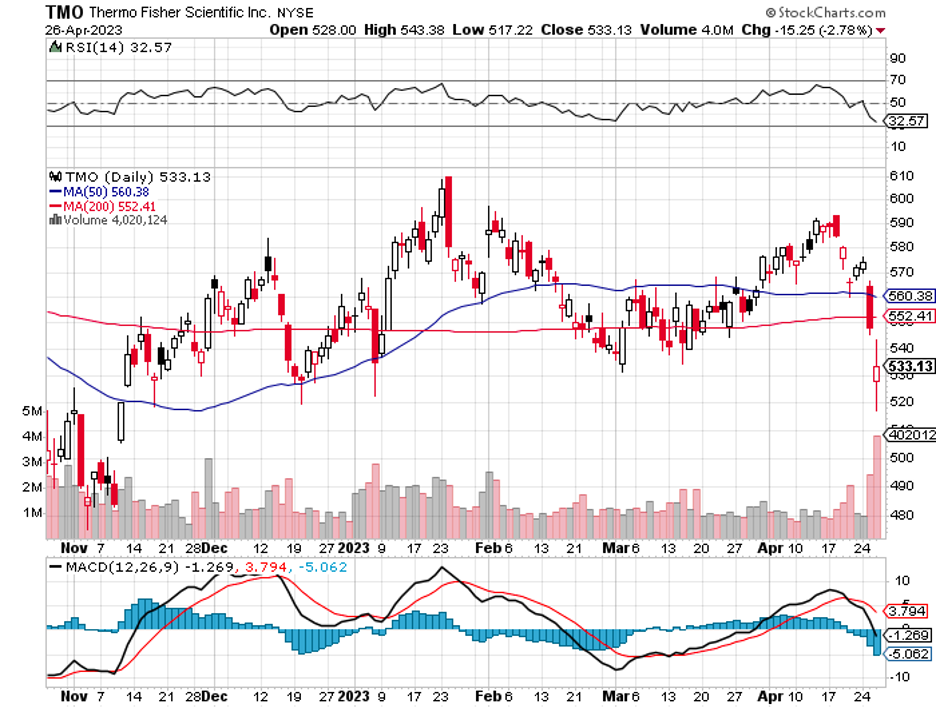The Underappreciated Giant
Here’s a question to test your biotechnology and healthcare knowledge: Can you think of a company that doubled its earnings during the pandemic yet currently trades at a lower valuation than it did at the beginning of 2020?
The answer might surprise you. It’s Thermo Fisher Scientific (TMO).
Despite benefiting from Covid-related demand, Thermo Fisher's stock price has not kept pace with its strong sales growth. Perhaps you weren't aware of Thermo Fisher and its role in supplying researchers with essential tools for developing life-saving drugs and tests. Regardless, it's a company worth paying attention to now.
Based in Waltham, Massachusetts, this healthcare supplier is one of the world's most prominent analytical instrument, reagent, consumables, software, and service providers, catering to industries like biotechnology, clinical diagnostics, pharmaceuticals, environmental monitoring, and food safety.
With a market capitalization of over $210 billion, the company benefited greatly from Covid-19 testing, resulting in earnings per share skyrocketing from $12.35 in 2019 to over $25 in 2021.
Thermo Fisher's earnings have declined as the pandemic subsides, leading to a corresponding dip in stock price. However, this downturn looks to be temporary. Moreover, the company is still poised for growth.
Looking at the turn of events, it’s clear that investors tend to be overly fixated on the company's performance during the pandemic, which represented only a tiny part of its overall business. This should no longer be the case, especially since Thermo Fisher has already provided strong guidance, which is more critical than short-term fluctuations.
Thermo Fisher Scientific's full-year guidance was offered in February following the announcement of impressive fourth-quarter results. The healthcare supplier expects to earn $23.70 per share in 2023, alongside revenue of $45.3 billion, exceeding the average analyst projections of $23.07 per share in earnings and $43.8 billion in revenue. Nevertheless, the predicted per-share profit is lower than the previous year's $25.13.
Due to the two-year decline in earnings since the pandemic boom, the company's shares have fallen by 14% since the end of 2021. As expected, this has led to investors being spooked by the problematic comparisons to the pandemic period. Consequently, the stock is currently trading at 24 times forward earnings, which is about its five-year average and below its pandemic high of 26.6 in December of 2021.
By 2024, however, Thermo Fisher is expected to surpass its all-time high earnings, with estimated earnings per share of $26.70. This figure is expected to continue to increase, with a projection of more than $30 per share in 2025.
Given these metrics, it’s evident that Thermo Fisher is a stock worth holding onto for the long term. More importantly, its current valuation makes it an attractive option for new investors.
Despite being categorized as a growth stock, Thermo Fisher benefits from consistent, recurring revenue from customers engaged in complex research and development. This makes the shares appealing in light of recent market volatility.
Thermo Fisher is a beacon of hope in the healthcare industry, where creating drugs is complex and requires advanced tools and technologies.
For example, newer products, such as biologics and larger molecule drugs, which are produced differently and require specialized equipment, provide Thermo Fisher with excellent opportunities to shine. The company is positioned to benefit from this trend as it provides researchers and developers the necessary tools and equipment.
Notably, Thermo Fisher is agnostic to specific drugs or the success of individual companies in the industry. Hence, regardless of the focus of healthcare companies, the company remains a staple in their laboratories.
In the company's latest earnings report, the confidence that comes with supplying a range of growing healthcare end markets was evident, thanks to an aging population and increasing treatment options. Additionally, the company raised its dividend by almost 17%, and its guidance suggests 7% core organic revenue growth, excluding acquisitions.
Discussing Thermo Fisher's acquisition strategy is almost inevitable when examining the company. Through this strategy, Thermo Fisher has broadened its revenue streams, customers, geographical reach, and business segments.
For context, ten years ago, the company was more instrument-focused. If a recession had occurred during that period, it would have had a much more significant impact on the company. Today, the business is less cyclical and less vulnerable to severe downturns.
Thermo Fisher executed its acquisition strategy without raising its debt ratios too high. At the end of 2022, the company's net debt to Ebitda ratio was 2.2 times, its second lowest level since 2013. Its total debt to Ebitda ratio of 2.9 times is also below the pre-pandemic period dating back to 2013.
Furthermore, Thermo Fisher's free cash flow is expected to increase to $7.2 billion this year, nearly twice the amount in 2018. This allows the company to pursue additional acquisitions and return more cash to shareholders in the form of dividends and share repurchases, as it has been doing in recent years.
Overall, Thermo Fisher holds a winning formula. It has good returns and a management team that makes the right decisions with its cash. On top of these, the company has more than ample room for long-term growth.




